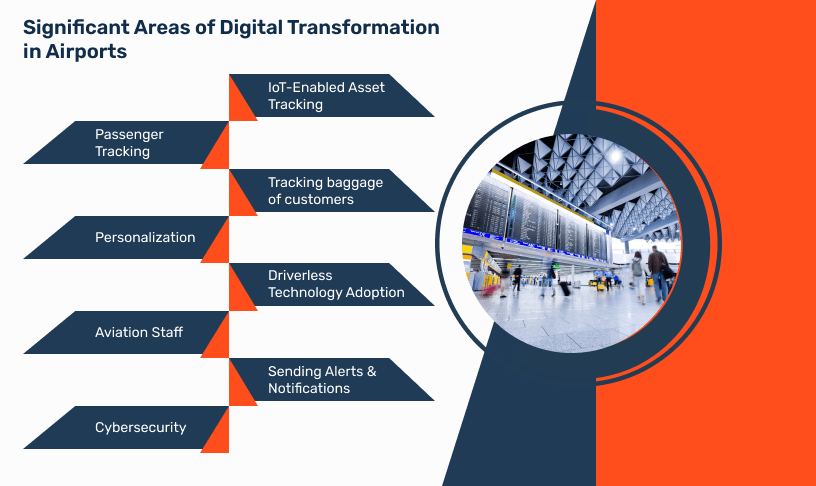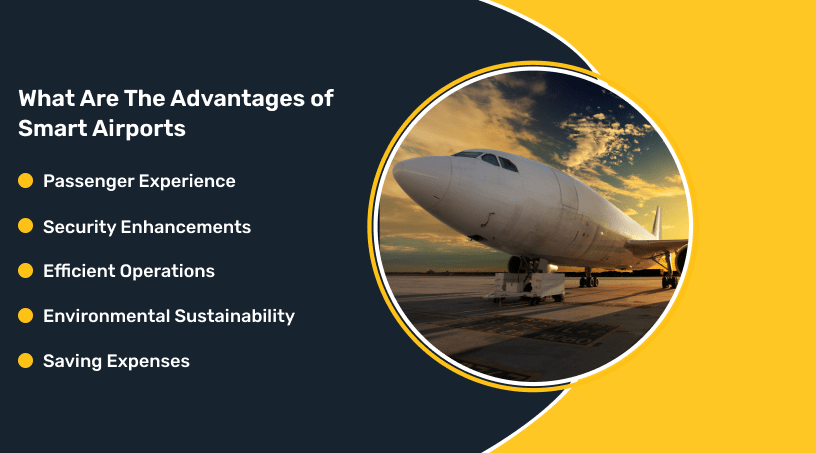- 6 min read
- Aug 24, 2023
- 0

During the last few years, the aviation industry verticals have risen to new heights with an ongoing passenger base and the extensive need for secure and effective operations. In order to tackle the exponential growth in the number of passengers in the coming years, airports as well as airlines will need the powerful capabilities of digitization. Airport IoT solutions are a great way to incorporate scalable IT and digital solutions to advance operational efficiency and revenue. It provides effective operations, hyper-personalized customer experiences and visualized safety. Innovative IoT airport solutions are transforming the aviation industry by targeting the challenges based on delivering a unique experience to passengers and the environment. This blog post sheds light on the major aspects of IoT solutions and their effect on airport experiences.
What is a smart airport?
Smart Airports are considered a new generation of airports that have the potential to leverage state-of-the-art technologies including advanced data analytics, IoT, AI, and automation for streamlining operations. It helps to enhance passenger experience, improve security as well and boost sustainability. The process of deploying intelligent systems and devices within the airport process ecosystem can be outrageous as it can drive a remarkable change in the airport landscape. Airports are advancing in important areas by embracing digital transformation to optimize resource utilization, streamline operations and embellish airport functionalities.
The concept of smart airports is implemented through unique applications that accelerate them towards the future. Having biometric identification, AI-enabled cybersecurity and IoT-based surveillance, airports are taking security measures to another level. With optimized airport operations, smart monitoring, energy-efficient infrastructure and waste management, smart airports are improving over the course of time. Smart airports are transforming the way airports function offering passengers an important travel experience.
Significant areas of digital transformation in airports

The demand for IoT is amplified by the increased adoption of location tracking, remote working, facial recognition, vaccine tracking, cold chain logistics, deployment of 5G and many more. As more people are using smartphones, it leads to IoT innovation across different industry verticals. With the integration of IoT, technology airports are capable of drilling into user behavior and utilizing insights for customer engagement.
IoT technologies integrated with airport operations have improved traffic regulations and assisted passengers with indoor navigation through WiFi-connected maps. IoT-based sensors are utilizing sensors for tracking and tracing baggage significantly reducing the situation of lost baggage. IoT development companies are harnessing the potential of IoT technology to provide intelligence to airports and pave the way for a smart aviation process.
IoT-enabled asset tracking
To ensure smooth operations and embellished passenger experience, airports have begun to incorporate IoT technology. In addition to biometric technology, big data analytics and AI, airport authorities can include modern airports for further streamlining and strengthening asset tracking. IoT asset-tracking solutions can be applied throughout the entire ecosystem of advanced airports. The IoT-driven technologies will ensure that the aviation industry has complete control over resources and assets, significantly creating value for a smart airport.
Passenger tracking
IoT technology is considered a powerful tool that is capable of resolving the complexities involved in passenger management. The utilization of biometric systems integrated with inbuilt tracking mechanisms helps airport authorities monitor real-time passenger footfall and streamline passenger tracking. It develops systems that can spot passengers.
Tracking baggage of customers
In smart airports, IoT solutions assist in overcoming the problem of lost baggage which has always caused major issues in airlines. Having IoT technology at services, airport authorities can easily monitor baggage location in real-time across several touchpoints. This enables passengers to track their belongings from check-in to cargo which is important in diminishing lost baggage counts.
Personalization
When IoT technology is combined with airport processes, it helps to revolutionize online bag drop and check-ins. For instance, it automatically issues seat assignments and issues a ticket prior to the flight. Flight delays are a great problem and result in major issues within the aviation industry. By means of connecting weather monitoring systems across, it keeps tabs on weather updates and shares insights with back-end systems. This assists in improving flight management as well as saves overall costs.
Driverless technology adoption
Based on the sensor systems, edge, camera and cloud computing, IoT is set to redefine transportation in airport operations. Driverless transport technology is using Internet of Things software development solutions to gain prominence in airports.
Aviation staff
With the robust implementation of IoT technology, airports get the flair to drive real business value for enterprises in terms of speed, experience and performance. It promotes device-to-device connectivity through an effective IoT cellular network. For streamlining airline processes, IoT technology assists businesses in gathering data as well as deriving insights from multiple sources.
Sending alerts & notifications
There are times when airports stretch across vast areas, it becomes difficult to choose the right entry and exit points. Digital IoT beacons can make an effective difference in helping passengers navigate the various zones of the airport.
Cybersecurity
Cybersecurity is considered an enhanced airport security system. AI-enabled cybersecurity solutions are highly influential in protecting sensitive data systems and communications from cyber attacks. There is a wide range of threats going on in airport operations including ransomware and malware. In this scenario, AI algorithms can be harnessed to detect potential threats in real time and analyze network traffic. AI-enabled cybersecurity maintains the security of airport operations and protects functional data.
What are the advantages of smart airports

In this context, we have curated a list of benefits of smart airports.
Passenger experience
IoT technology has led to advanced customer satisfaction with faster check-in, boarding processes, baggage handling, as well as better amenities.
Security enhancements
The security enhancements laid forth by IoT technology have proved beneficial for airport processes. It is used for monitoring, advanced surveillance, and identification systems to ensure a safe airport ecosystem.
Efficient operations
With the effective implementation of IoT technology airports can experience increased effectiveness in processes with real-time data analysis and automation.
Environmental sustainability
IoT smart airport systems provide a higher focus on energy-efficient infrastructure and eco-friendly practices for reducing the airport’s carbon footprint.
Saving expenses
Smart airports have several benefits that involve reducing functional expenses with energy-effective infrastructure and optimized resource uses.
Conclusion
With the passing years, the Internet of Things has come a long way. It revolutionized the global aviation industry and paved the way for innovative experiences. It has transformed the entire mechanism of airport operations. The process of embracing innovation and technology has proved a boon for the competitive aviation industry. Smart airport solutions developed with custom IoT technology stacks offer premium quality tech solutions for aviation industry verticals. As the leading software development company, Nextbrain comprises experienced IoT developers having several years of expertise in creating custom solutions for the aviation industry. Get in touch with our experts to learn more about airport IoT solutions.
